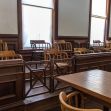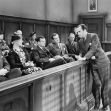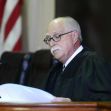Three days into a conspiracy trial in New York, a juror tested positive for the novel coronavirus. The judge said the trial must go on and replaced the infected juror with an alternate.
In Pittsburgh, trials are going on but courtrooms are closed. When one judge denied a watchdog nonprofit legal firm virtual access to his courtroom, they sued him.
Courts in Texas will not open despite Gov. Greg Abbot’s announcement that the state’s mask mandate is rescinded and “it’s time to open Texas 100%.”
Three court employees in Los Angeles have died after testing positive for COVID-19, and 445 others have also tested positive. Yet, courts remain open and corridors remain crowded.
A major trial against opioid makers by New York's attorney general and local governments will be postponed due to coronavirus concerns.
These are just a few examples of the havoc facing courts across the country as they try to figure out how to balance COVID-19 safety with the need to proceed with critical, life-affecting court hearings.
Court closures and trial delays are not just theoretical. People have died. As a result, courts don’t know whether to open or close; if they do open, are the measures they take adequate to protect public safety? In many cases, they have installed plexiglass in courtrooms and break rooms, created mandatory double mask-wearing and social distancing rules, and put hand sanitizer dispensers throughout the building. But will such measures placate a juror whose contaminated colleague was just replaced with an alternate?
On the fourth day of a conspiracy trial that was expected to last three weeks, Manhattan U.S. District Judge Jed S. Rakoff announced that a female juror tested positive for COVID-19. The judge announced he had consulted with a medical expert and decided the trial could continue. He said, “The powers that be are comfortable with our continuing. This is why we have alternates.”
Rakoff also offered free testing to the remaining jurors who he said could have “slight contact” with each other, while promising he would continue to monitor the situation.
While Rakoff was proceeding with his case, a Pittsburgh judge was denying court watchers virtual access to his closed courtroom. Common Pleas Judge Anthony Mariani of the Allegheny County Courthouse is the only judge in the courthouse who refuses to allow observers from the Abolitionist Law Center (ALC) to see what’s going on behind closed doors. The non-profit law firm has requested remote transmissions from his courtroom 220 times since January.
On March 2, the ALC sued Mariani, seeking a declaratory judgment and injunctive relief to “remove that unconstitutional blockage and restore the public’s First Amendment right of access to the courts.” The suit was filed in the U.S. District Court of Western Pennsylvania, and the ALC is represented by the American Civil Liberties Union of Pennsylvania (ACLU) and the Institute for Constitutional Advocacy and Protection at Georgetown University Law Center. They argue the denial of remote access is unwarranted because “they have teams and hardware” that can easily rectify the denial.
The lawsuit cites an order from the County’s President Judge that “provides, with limited exceptions, that ‘all matters shall be conducted remotely via Advanced Communication Technology (ACT) and no in-person hearings or proceedings shall occur in any division of the Court of Common Pleas.’” The order was prompted by nine court employees testing positive for coronavirus, including one who worked for Mariani.
ACLU director Reggie Shuford issued a statement that said, “Courts operate openly, not in secret, and this judge cannot be allowed to escape scrutiny while refusing to implement common sense strategies to prevent the spread of COVID-19.”
In Los Angeles, investigators from a local news channel reported that five legal services groups are now suing LA Superior Court because of safety concerns. They want simple matters like traffic to shut down. And in addition to juror fears, attorneys told the court they are fearful as well. One attorney, Trinidad Ocampo, told reporters, “Appearing in court is like playing Russian Roulette. "
As coronavirus cases are decreasing, COVID-19-related lawsuits are increasing. Courts are caught in the middle, and the search for how to protect the safety of court employees, attorneys, and jurors continues and morphs into new challenges daily.






